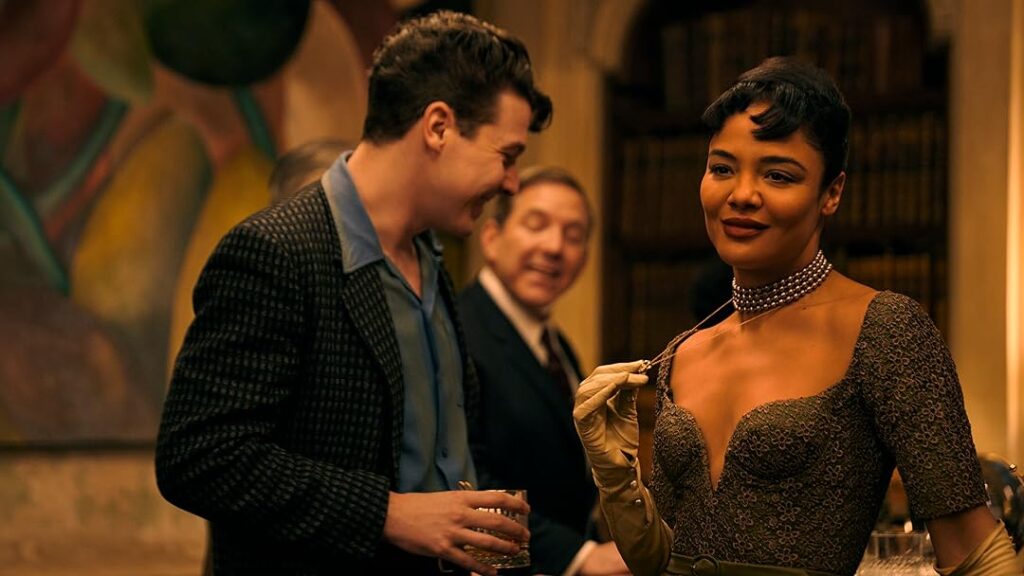Hedda Gabler (Tessa Thompson) knows she’s beautiful. She is also wildly unpredictable and passionately independent. Where our tale begins, she is currently a young newlywed trying to make a life with husband George Tesman (Tom Bateman). George’s preoccupation is with impressing everybody that he meets. Within the sprawling English manor, the course of the night sharply turns.
Hedda is director Nia DaCosta’s fourth feature, and one of her standouts. Adapted from Henrik Ibsen’s 19th-century play, Hedda Gabler, DaCosta’s take puts these characters in the middle of the 1950s, where times were already fraught with tension. She also adapts the menagerie of characters, trading in traditionally white roles and diversifying them.
Thompson plays Hedda with a sense of poise that belies just how calculating and dangerous she is beneath. The opulent scenery often features Hedda someplace in the background, looking casual, but in the way a cat on the hunt is casual. However, once her former lover Eileen Lovborg (Nina Hoss) arrives, and with her Thea (Imogen Poots), her new partner, Hedda’s directions turn calculated and sinister.
Thanks to her new partnership, Eileen has written a book, and one that is sure to get her academic career kickstarted up again. The problem: George and Eileen are up for the same professorship. Hedda’s lifestyle depends on George landing the job, and, like an animal backed into a corner, Hedda begins to devise a plan to unravel everything Eileen has done.
The reimagining of a classic into something modernly refreshing

DaCosta remains true to Ibsen’s original work. Throughout, Hedda is the story of a woman who doesn’t know what she wants. She is unhappy with being a housewife, and it is unclear as to whether or not she truly loves George. Implacable and restless, she seeks amusement wherever she can find it. Eileen has been sober, but Hedda remembers the side of her that comes out when drunk. It’s her perfect end: Get Eileen drunk, ruin her chance at the professorship, and maintain the extravagance Hedda so clearly craves.
Thompson’s manipulations as Hedda are a wonder to behold. She maintains an unaffected facade, the camera trailing after her while she twists and toys with every man at the party. She’s beautiful, and she knows it. it is her weapon to wield, much like the gun seen at the beginning of the film that was given to her by her father.
Ibsen’s original work was the kind of female-led melodrama one expects from a 19th-century work written by a man. DaCosta deftly snips those threads and sews them into something new, giving Hedda a queer identity that serves to add more dimension to her character. Rather than let the men win, DaCosta uses the oft-overlooked strength and resilience of women in that time period.
Hedda regrets her choices–monogamy, a heterosexual marriage–but never once does that posit her as weak. If anything, it serves to make her stronger and more dangerous, because her intelligence has something to focus on. Though she may have no remorse, we are still left feeling something for her.
Hedda is sexual, sultry, and riveting. For DaCosta’s first original work in nearly a decade, it’s a revitalizing reminder of her prowess as a director.
For more Reviews, make sure to check back to That Hashtag Show.

![‘Hedda’: Delightfully Wild, Tessa Thompson Is Hypnotic [Review]](http://18.211.146.234/wp-content/uploads/2025/11/project_20251001_1656018-01-1-1280x640.png)
![HBOMax’s Kamikaze is a beautiful story of grief and triumph [REVIEW]](http://18.211.146.234/wp-content/uploads/2021/11/project_20211124_1352324-01-440x264.png)

![Godzilla VS. America: Los Angeles [Non-Spoiler Review]](http://18.211.146.234/wp-content/uploads/2025/04/godzilla-thumb-440x264.jpg)
